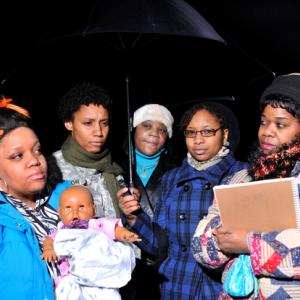
Jason Howard is the author of A Few Honest Words: The Kentucky Roots of Popular Music and co-author of Something's Rising: Appalachians Fighting Mountaintop Removal. His features, essays, and reviews have appeared in The Nation, Equal Justice Magazine, No Depression, Paste, and The Louisville Review, and his commentary has been featured on NPR.
Posts By This Author
Living 'Next Door to the Dead'
Kathleen Driskell on living Next Door to the Dead

Jaroslaw Grudzinski / Shutterstock
ABOUT 20 YEARS AGO, just after she and her husband had bought a house in the countryside outside of Louisville, Ky., Kathleen Driskell returned home from the grocery to find her driveway filled with cars. With one arm grasping bags of food and the other holding on to her young son, she looked around to see what was happening. Mournful figures in dark coats were moving back and forth in the lot next door to her house. And then her eyes rested on something that made her jaw drop: a hearse.
On one hand, Driskell shouldn’t have been surprised. The house she and her husband purchased was actually an old country church dating from the 1850s, which they had begun converting into a home, transforming the sanctuary into an open living and dining room and using the honey-colored pews to build a staircase. Like most rural churches from the 19th century, it was right beside a graveyard. But the old preacher who sold them the building had assured them it was no longer in use, that there would be no more burials. “I asked him flat out,” she recalls with a smile. “And he said that it was full up and it’s been full up.”
Over the years, there have been eight or nine more burials in the graveyard next door. But after recovering from her initial shock at happening upon that first scene, Driskell realized that she didn’t mind. “I just don’t think about graveyards that way,” she says. “I never really have thought about them as being spooky places.” Instead, she has found herself inspired by the cemetery and its dead—so intrigued, in fact, that she has written a poetry collection about her experience with her “neighbors,” as she calls them, documenting her literal and imaginative walks among the tombstones.
You Gotta Move
American artist Parker Millsap spreads his "Truck Stop Gospel."
INSIDE TOWN HALL, New York’s legendary concert venue, the dusty twang of a harmonica slices through the low din of the crowd filling the 1,500-seat auditorium. Most are likely here for the headliner, singer-songwriter Patty Griffin, who will take the stage after this, a performance by her opening act, Parker Millsap.
The bluesy riffs from Millsap’s harmonica are intense, long and wailing, before fading into the slow, dirty licks of a slide guitar. Then a voice, old and soulful, throbs through the room, crying out the first line of the old gospel standard “You Gotta Move” and shocking many in the audience, residents of a city where very little is shocking. You can see the wave of surprise move like a serpent across the room, with people turning to their companions, eyebrows raised and a whisper on their lips.
It’s the age that gets them—the man standing at center stage, flanked by two bandmates and looking like a rockabilly idol, with his gelled quiff and rolled-up shirt sleeves, isn’t the 60-year-old blues singer he sounds like. No, he is baby-faced, young—barely even 21—and yet he’s pulling this song from some secret, battered place inside him that’s far older than his years, and matching it with a sensual intensity that sizzles in the audience. By the time Millsap allows the last note from his weathered voice to fade, he has commanded the undivided attention of one of the world’s toughest crowds.
And they are raring for more.
Beauty in Battered Places
A conversation with novelist and activist Denise Giardina
“THE CHURCH radicalized me,” celebrated author and ordained Episcopal deacon Denise Giardina once said, describing how she sees herself as both social activist and servant minister. “The phrase in the prayer book is ‘Interpret the world to the church and the church to the world.’ It’s a totally different way to advocate, with a spiritual point of view.”
This philosophy has shown up in her bestselling novels, published over her long career, such as Storming Heaven (1987) and The Unquiet Earth (1992), which chronicle the history and social impacts of coal mining in Giardina’s native Appalachia; Saints and Villains (1999), which tells the story of Dietrich Bonhoeffer’s resistance against Hitler and the Nazis; and, most recently, Emily’s Ghost (2010), a reimagining of Emily Brontë’s story and how her life was changed by her encounter with an ardent member of the clergy.
Shortly before her recent retirement from teaching creative writing at a West Virginia college, Giardina talked with Jason Howard, author of A Few Honest Words and coauthor of Something’s Rising, about her literary career, social justice activism, and her time in the late 1970s in Washington, D.C., as a member of Sojourners community (the intentional Christian community that founded Sojourners magazine and other ministries).
Wounding and Welcome in the Church
"Does Jesus Really Love Me? A Gay Christians Pilgrimage in Search of God in America"
TWO YEARS AGO, Jeff Chu found himself at a crossroads. Like many gay Christians, he felt disconnected—condemned by a wide swath of his fellow believers because of his sexual orientation, questioned because of his faith by some in the LGBTQ community who have been pushed out of the church by the words and actions of many Christians. To top it off, there was that lingering doubt, so common among those raised in evangelical households: Does Jesus really love me?
To answer that question, Chu—an award-winning writer for Time, The Wall Street Journal, andCondé Nast Portfolio and the grandson of a Southern Baptist preacher—took off on a yearlong cross-country pilgrimage, “asking the questions that have long frightened me.” What he encountered was a divided church, “led in large part by cowardly clergy who are called to be shepherds yet behave like sheep.”
Many of the pastors Chu contacted for the book refused to speak with him, citing their suspicion of him as a member of the so-called “‘liberal media elite’” or stating bluntly that engaging on such a controversial issue might jeopardize funding for a pet project. After speaking with Richard Land, then-president of the Ethics & Religious Liberty Commission of the Southern Baptist Convention, and David Shelley, a Baptist minister from Tennessee affiliated with the Family Research Council, Chu concludes that they “devote much more time talking about legislation than about love.”
Then there are those he interviewed who are known more for screaming than talking. In meeting with members of the infamous Westboro Baptist Church, Chu does not shy away from controversy—or his own fears. “Some nights before my departure,” he recalls of the days before his trip to Kansas, “I had nightmares, and many mornings I’d wake with my jaw tight and teeth clenched.” His encounter with Rev. Fred Phelps, the grizzled, homophobic pastor of the church, is perhaps the most riveting of the book, culminating in a surreal, grudging offer of friendship from Phelps.
Stage Presence
Kentucky theater company founder Cathy Rawlings lifts up black culture.
THE CHOIR AT Lexington, Kentucky’s Imani Missionary Baptist Church is revving up for worship, focusing on things above as the cry of the organ and dissonant blues riffs of the piano fill the large, modern sanctuary. The director gives Cathy Rawlings the signal, and she strolls out in front. As they launch into the spiritual “I’m Glad,” she closes her eyes and offers up a silent prayer. Satisfied, she takes the microphone and begins to recite a poem, “The Creation” by famed Harlem Renaissance poet James Weldon Johnson:
And God stepped out on space
And he looked around and said:
I’m lonely—
I’ll make me a world.
Published in 1920 and written as a tribute to African-American religious oratory, “The Creation” occupies a hallowed place in black American culture. In the poem, God seems to take on the style of a black preacher, walking around, emphasizing specific syllables, and pausing for breath at particular points during the creation story.
Where Her Heart Is
Humanitarian, award winning actress, and best-selling author Ashley Judd reflects on her faith and "true calling" -- social justice activism.

